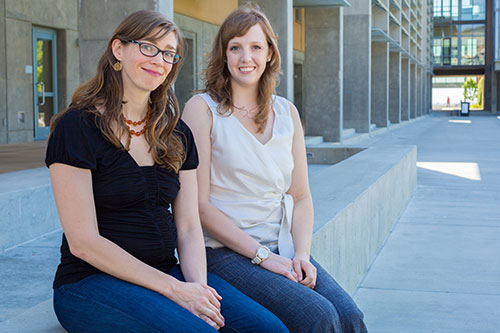Researcher Makenzie Provorse parlayed her passion for computational chemistry into a position as UC Merced’s second Chancellor’s Postdoctoral fellow.
As a runner up for the Presidential Postdoctoral Fellowship — a 31-year-old program enhanced with more money for hiring incentives recently by UC President Janet Napolitano — her application was referred back to the campus for the chancellor’s fellowship, and ranked highest among all applicants at UC Merced.
 “This is a wonderful recognition for our campus,” School of Natural Sciences Dean Juan Meza said. “Makenzie is a great example of someone who is not only an excellent researcher, but someone who also deeply cares about teaching and diversity. We are fortunate that she chose UC Merced for her postdoctoral research.”
“This is a wonderful recognition for our campus,” School of Natural Sciences Dean Juan Meza said. “Makenzie is a great example of someone who is not only an excellent researcher, but someone who also deeply cares about teaching and diversity. We are fortunate that she chose UC Merced for her postdoctoral research.”
Provorse started at UC Merced in August 2014, working with Professor Christine Isborn.
“I feel privileged that someone with Makenzie’s qualifications would seek me out as a mentor for her postdoctoral work,” Isborn said. “She has been a very positive presence in my research group, helping mentor undergraduate and graduate students, and taking our work modeling electron dynamics in new directions. I look forward to continue working with her through this fellowship program.”
Provorse and Isborn are using quantum chemistry to study the excited states and electron dynamics of molecules. This work will lead to a better understanding of charge transfer in molecules which, Provorse said, has applications including renewable energy, particularly in photovoltaic cells and photocatalysis.
Provorse wants to become a faculty member and said she welcomes the opportunity to practice her teaching skills with Isborn.
“I co-taught a quantum chemistry class in the fall,” she said. “It was a great chance to test my teaching theories. I learned a lot, which is the whole purpose of having an opportunity like that.”
Napolitano started the president’s and chancellor’s fellowships as a way to encourage a more diverse faculty and support outstanding scholars, committing $5 million to enhance the hiring incentive for fellows hired as UC faculty members at the completion of their fellowships.
The money will pay for part of Provorse’s yearly salary starting in August, and provides her with a travel budget so she’ll be able to attend more conferences to present her work and network with other fellows and scholars.
She plans to “be very productive” when it comes to publishing research papers during her coming year of postdoctoral fellowship, and further prepare for the job market.
“It will be a good test of my abilities to juggle being productive in teaching and research,” she said.
In addition to her ambitions in research and teaching, Provorse has prioritized her mentorship of women in science fields, Isborn said.
“I’ve organized several panel discussions for the Women in STEM group,” she said. “It’s been a great opportunity for students and postdocs to connect with women faculty in the STEM fields.”



